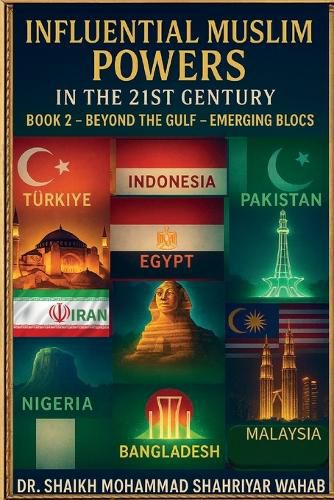Readings Newsletter
Become a Readings Member to make your shopping experience even easier.
Sign in or sign up for free!
You’re not far away from qualifying for FREE standard shipping within Australia
You’ve qualified for FREE standard shipping within Australia
The cart is loading…






This title is printed to order. This book may have been self-published. If so, we cannot guarantee the quality of the content. In the main most books will have gone through the editing process however some may not. We therefore suggest that you be aware of this before ordering this book. If in doubt check either the author or publisher’s details as we are unable to accept any returns unless they are faulty. Please contact us if you have any questions.
The Muslim world in 2025 presents a multifaceted and rapidly changing landscape. This book comprehensively analyses influential Muslim-majority and Muslim-minority countries, examining their historical evolution, political systems, economic development, military capabilities, technological advancements, and global roles. The study focuses on Egypt, Tuerkiye, Pakistan, Indonesia, Malaysia, Nigeria, Iran, and Bangladesh, representing a diverse spectrum of geopolitical contexts and internal dynamics.
The selection of these countries reflects their significant weight in global affairs and the vast array of challenges and opportunities they face. The book employs a comparative approach, allowing for the identification of common trends and unique national trajectories. A key theme is the complex relationship between religious identity and political stability, exploring how religious beliefs and practices intersect with political systems and societal structures.
We also examine the countries' economic development strategies, challenges related to poverty and inequality, and efforts to diversify their economies. Furthermore, the analysis sheds light on the countries' military modernisation efforts, regional security roles, and complex relationships with global powers. The rise of non-Western alliances, such as BRICS and the SCO, significantly alters the geopolitical landscape.
The book analyses how these alliances shape the foreign policy choices of the featured countries, as they navigate shifting global power dynamics and strive to safeguard their national interests. Ultimately, this study provides crucial insights into the evolving power dynamics within the Muslim world and the growing influence of these key players on the global stage, contributing to a more nuanced and informed understanding of a critical region in a rapidly transforming world.
$9.00 standard shipping within Australia
FREE standard shipping within Australia for orders over $100.00
Express & International shipping calculated at checkout
This title is printed to order. This book may have been self-published. If so, we cannot guarantee the quality of the content. In the main most books will have gone through the editing process however some may not. We therefore suggest that you be aware of this before ordering this book. If in doubt check either the author or publisher’s details as we are unable to accept any returns unless they are faulty. Please contact us if you have any questions.
The Muslim world in 2025 presents a multifaceted and rapidly changing landscape. This book comprehensively analyses influential Muslim-majority and Muslim-minority countries, examining their historical evolution, political systems, economic development, military capabilities, technological advancements, and global roles. The study focuses on Egypt, Tuerkiye, Pakistan, Indonesia, Malaysia, Nigeria, Iran, and Bangladesh, representing a diverse spectrum of geopolitical contexts and internal dynamics.
The selection of these countries reflects their significant weight in global affairs and the vast array of challenges and opportunities they face. The book employs a comparative approach, allowing for the identification of common trends and unique national trajectories. A key theme is the complex relationship between religious identity and political stability, exploring how religious beliefs and practices intersect with political systems and societal structures.
We also examine the countries' economic development strategies, challenges related to poverty and inequality, and efforts to diversify their economies. Furthermore, the analysis sheds light on the countries' military modernisation efforts, regional security roles, and complex relationships with global powers. The rise of non-Western alliances, such as BRICS and the SCO, significantly alters the geopolitical landscape.
The book analyses how these alliances shape the foreign policy choices of the featured countries, as they navigate shifting global power dynamics and strive to safeguard their national interests. Ultimately, this study provides crucial insights into the evolving power dynamics within the Muslim world and the growing influence of these key players on the global stage, contributing to a more nuanced and informed understanding of a critical region in a rapidly transforming world.